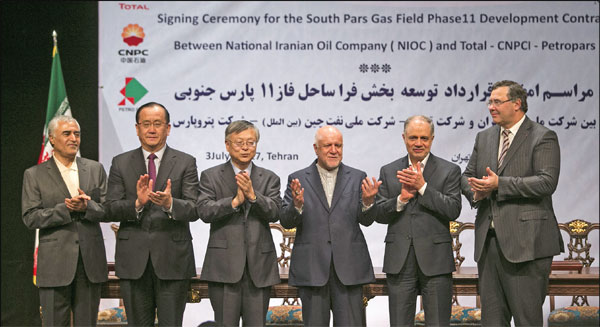Oil giants sign deal to tap Gulf gas reserves
Chinese, French and Iranian energy giants signed a $4.8 billion (4.2 billion euros; £3.7 billion) deal on July 3 to develop the world's largest natural gas reserve in the Persian Gulf.
The parties - China National Petroleum Corp, France's Total and the National Iranian Oil Co, through its Petropars subsidiary - will develop the South Pars gas field, the first major energy investment since sanctions against Iran were lifted early last year. Production is to begin within 40 months, according to the agreement.
The French company will have a 50.1 percent interest, with CNPC owning 30 percent and Petropars 19.9 percent.
|
China National Petroleum Corp, France's Total and the National Iranian Oil Co, through its Petropars subsidiary, signed a $4.8 billion deal on July 3 to develop the South Pars gas field in the Persian Gulf. Xinhua |
As China's biggest oil and gas producer, CNPC "can provide experience in gas development, needed investment and access to the Chinese market for this project", says Wang Lu, an analyst from Bloomberg Intelligence.
The investment could further diversify China's import sources and secure the country's natural gas supply, he says.
China aims to raise the share of gas in primary energy consumption to a range of 8.3 to 10 percent in 2020, from 5.9 percent in 2015, Wang says. He adds that China will rely more on gas imports to achieve the target.
CNPC said it was finalizing details with the Iranian side.
Iran's Petroleum Minister Bijan Namdar Zanganeh says the country's oil industry needs about $200 billion in investment over the next five years. The country, with its 33.5 trillion cubic meters of proven reserves, ranks first in the world, according to BP.
According to the International Energy Agency, the South Pars field holds an estimated 51 trillion cubic meters of gas. It accounts for approximately 19 percent of the world's total gas reserve.
"Iran's crude oil supplies to China have remained consistent and fairly stable," says Oceana Zhou, an analyst at S&P Global Platts.
With the new deal, China and Iran are expected to further enhance cooperation in the energy sector, Zhou says. "This is a mutually beneficial relationship, as Iran needs international partners to develop both its upstream and refining sectors."
Challenges also exist, including "geopolitical risks and currency instability", says Liang Jin, manager of natural gas department at Beijing-based JLC Network Technology Co.
"Offshore investments are often exposed to these challenges, especially in Iran. But the transcontinental collaboration will, to some extent, lower project risks and present an irresistible opportunity for all parties," she says.
Regarding the reasons behind Chinese energy giants' overseas expansion, Zhou says: "They are investing in foreign upstream projects with the aim of establishing themselves as international companies and upgrading their profiles."
Contact the writers through jingshuiyu@chinadaily.com.cn



















